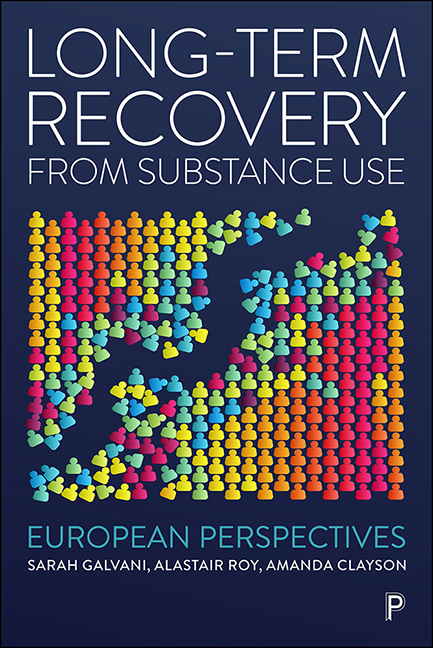PART I - Critical explorations of long-term recovery
Published online by Cambridge University Press: 15 September 2022
Summary
This first part of the book comprises five chapters and informs Parts II and III by offering a series of critical explorations of long-term recovery which engage the subject through the lenses of policy, practice, lived experience and research. Chapter 1 provides a brief overview of the history of recovery as a concept and our focus on long-term recovery as an extension of it. It sets the scene for the book by introducing some of the challenges faced by people trying to define recovery and long-term recovery in recent decades, before introducing the structure and content of the rest of the book. Chapter 2 provides a critical engagement with the evidence base for recovery. It explores recent shifts in methodological approaches to research on alcohol and other drug use, specifically considering moves towards the greater involvement of people with lived experience as active partners in research, as well as the use of theory driven approaches to programme and strategy evaluation. The chapter provides an examination of the epistemological and methodological issues involved in researching long-term recovery at the levels of policy, practice and lived experience, as well as a much needed consideration of issues of epistemic (in)justice. Chapter 3 presents findings from a UK-based, ESRC-funded study, drawing on one transgender woman's ongoing recovery struggles. It argues that exploring the links between the micro level of lived experience, the meso level of practice and the macro level of policy is important for developing and honing our understanding of the lived effects of the implementation of recovery policy. The chapter concludes by arguing that there are important tensions between the policy storyline about recovery and the everyday lives of people with substance-use issues. Chapter 4 draws on findings from the Norwegian long-term Stayer study to describe the diverse and sustained change processes that people in recovery must negotiate in order to develop meaning and purpose in their ongoing lives. The chapter clearly demonstrates the value of long-term research on change processes in substance-use recovery, making a series of practical suggestions for practice.
- Type
- Chapter
- Information
- Long-Term Recovery from Substance UseEuropean Perspectives, pp. 1 - 2Publisher: Bristol University PressPrint publication year: 2022



